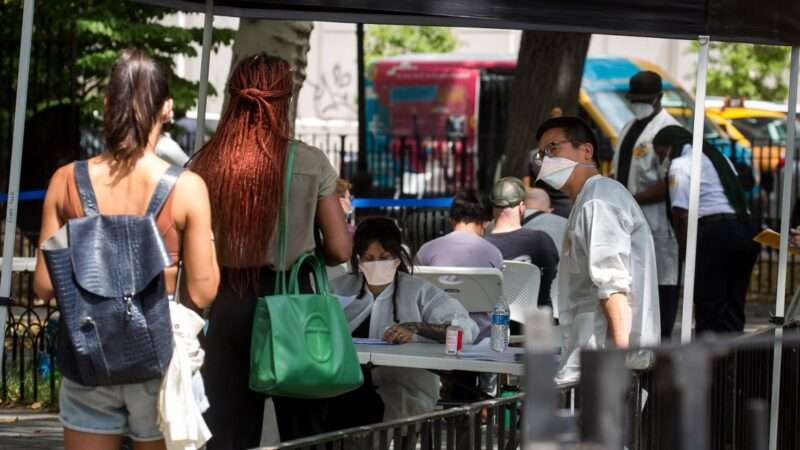
The federal government has not only failed to get its act together to bring monkeypox vaccines here from Denmark but also made it a nightmare for doctors to prescribe the vaccines we do have on hand.
Since Reason last wrote about the poor handling of the monkeypox outbreak by the Centers for Disease Control and Prevention (CDC) and the Food and Drug Administration (FDA), there have been at least 600 more diagnosed cases of monkeypox in the U.S., and that's still likely an undercount. The official number of monkeypox infections in the country is now up to 1,470.
Roll Call reported Thursday that one of the big challenges doctors are facing, besides the lack of availability of one vaccine, is jumping through the appropriate hoops to provide a different vaccine. As Reason noted on Tuesday, there are more than a million doses of a vaccine named Jynneos in a storage facility in Denmark that is awaiting approval to be sent to the U.S., even though the facility has already been inspected by European officials.
There's another drug, TPOXX (full name: Tecovirimat), that can also be used to treat people infected with monkeypox. But access to the drug is restricted because the FDA has only officially authorized it to be used to treat smallpox. The CDC has protocols in place to research and allow the use of TPOXX to treat monkeypox, and in June, it listed some rules and documentation required to attempt to treat somebody infected using the drug.
It turns out this process requires physicians to fill out 100 pages of paperwork for each patient they want to prescribe TPOXX to. In a media call Thursday organized by the Infectious Diseases Society of America, medical leaders complained that this red tape made it "nearly impossible" to treat potentially hundreds of infected patients. It can take up to three hours to process a single patient just to get them the drug. Via Roll Call:
"If we learn something from the COVID-19 pandemic, it's that we need to pay attention to these sorts things so they don't get worse," said Lilian Abbo, the associate chief medical officer for Infectious Diseases for the Jackson Health System in Miami.
They're hoping to get the CDC to ease emergency access to TPOXX while continuing to conduct clinical trials, something the agency did to help get COVID-19 vaccinations out to the public more quickly.
The blame is being laid on the poor response of President Joe Biden's administration. Sen. Richard Burr (R–N.C.), who is a ranking member of the Senate Committee on Health, Education, Labor, and Pensions, sent a letter to Health and Human Services Secretary Xavier Becerra, complaining that the federal testing response has been too slow and that it was "disturbing" that the government had not figured out a long-term vaccination plan. He writes:
Beyond failures in testing, the administration's strategy to utilize vaccines and treatments that are effective against monkeypox has also been appalling. We have vaccines and treatments that we can use during this response. These tools are available in large part due to the resources the United States has provided for smallpox preparedness through Project BioShield. The availability of these products is a true success story of biodefense. But securing a stockpile of vaccines is only effective if we are able to get shots in arms.
The number of reported monkeypox infections has almost doubled in just a week. And, again, because of the lack of testing, it's certainly much higher. Fortunately, monkeypox is generally nonfatal if treated, just often very painful. There have been no deaths as yet attributed to it in the U.S. But it can happen: Africa has seen at least 73 monkeypox deaths this year. If the U.S. isn't going to do a competent job of distributing vaccines, it can at least not actively put up barriers to keep others from doing so.
The post Doctors Say Federal Bureaucracy Is Keeping Them From Adequately Treating Monkeypox appeared first on Reason.com.







